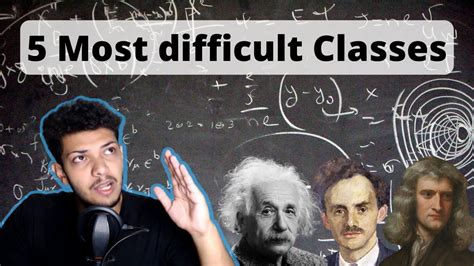Physics, the fundamental science of matter and energy, has always been regarded as one of the most demanding academic disciplines. Within the vast spectrum of physics courses, there are certain classes that stand out for their exceptional difficulty, pushing students to the limits of their intellectual abilities.

Classical Mechanics
Newtonian Mechanics
Classical mechanics, the cornerstone of physics, introduces the basic principles of motion, forces, and energy. Newtonian mechanics, developed by the legendary physicist Isaac Newton, forms the foundation of this field. Students grapple with concepts such as Newton’s laws of motion, momentum, and gravitational interactions. Its complexity stems from the mathematical rigor required to solve complex problems involving multiple bodies in motion, often requiring advanced calculus and differential equations.
Lagrangian and Hamiltonian Mechanics
For those seeking a deeper understanding of classical mechanics, Lagrangian and Hamiltonian mechanics offer a more sophisticated approach. These advanced formulations provide a powerful framework for describing the dynamics of physical systems in a generalized manner. Students explore concepts like generalized coordinates, constraints, and variational principles, requiring a solid grasp of vector calculus and linear algebra.
Quantum Mechanics
Introductory Quantum Mechanics
The realm of quantum mechanics, the study of the behavior of matter at the atomic and subatomic scales, presents a profound challenge to students. Introductory quantum mechanics introduces the fundamental principles underlying the wave-particle duality of matter, quantization of energy, and the uncertainty principle. It demands a thorough understanding of linear algebra, complex analysis, and probability theory, making it one of the most challenging courses for physics majors.
Advanced Quantum Mechanics
For those with an insatiable curiosity, advanced quantum mechanics delves deeper into the complexities of the quantum world. Students explore advanced topics such as quantum field theory, atomic and molecular physics, and particle physics. These highly specialized courses require a strong foundation in introductory quantum mechanics and extensive knowledge in other areas of physics, including electromagnetism and statistical mechanics.
Electromagnetism
Introductory Electromagnetism
Electromagnetism, the study of electric and magnetic fields and their interactions with matter, is another demanding physics discipline. Introductory electromagnetism covers the fundamental principles of electrostatics, magnetostatics, and electromagnetic waves. Students must master complex mathematical concepts such as vector calculus, Gauss’s theorem, and Faraday’s law.
Advanced Electromagnetism
For those with a keen interest in electromagnetic phenomena, advanced electromagnetism provides a rigorous exploration of Maxwell’s equations, boundary value problems, and special relativity. These advanced courses require a deep understanding of vector analysis and complex function theory, delving into the intricate behavior of electromagnetic fields and their applications in optics and plasma physics.
Statistical Physics
Introductory Statistical Physics
Statistical physics, the study of the macroscopic properties of matter from the microscopic behavior of its constituent particles, presents a unique challenge. Introductory statistical physics introduces the fundamental concepts of probability theory, statistical distributions, and thermodynamics. Students must develop a deep understanding of statistical mechanics and its applications to a wide range of physical phenomena.
Advanced Statistical Physics
For those seeking a comprehensive understanding, advanced statistical physics explores advanced topics such as statistical field theory, non-equilibrium statistical mechanics, and quantum statistical mechanics. These courses require a strong foundation in introductory statistical physics, along with knowledge of quantum mechanics and computational physics.
Special and General Relativity
Special Relativity
Special relativity, developed by Albert Einstein, revolutionized our understanding of space and time. It introduces the concepts of time dilation, length contraction, and the invariance of the speed of light. Students must grapple with advanced mathematics, including Lorentz transformations and Minkowski space, making special relativity one of the most challenging courses in physics.
General Relativity
General relativity, Einstein’s theory of gravity, is regarded as one of the most complex and challenging physics theories ever formulated. It extends special relativity to include the effects of gravity and the curvature of spacetime. Students must master advanced tensor calculus and differential geometry, delving into the intricacies of black holes, gravitational waves, and cosmology.
Conclusion
The pursuit of physics knowledge is a demanding but rewarding endeavor. The classes listed above represent some of the most challenging physics courses offered at universities around the world. They test students’ intellectual limits, demanding a deep understanding of complex mathematical concepts and a passion for unraveling the hidden complexities of the universe. Embarking on these academic journeys is not for the faint of heart but for those driven by an unyielding curiosity and a thirst for knowledge.
